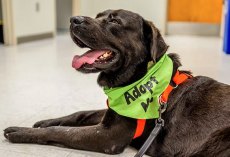Bringing home a rescue dog is the start of an amazing adventure — but before you dive into all the cuddles, outings and fun, there’s one thing your new pup needs more than anything else:
Time to decompress.
Why Rescue Dogs Need Decompression Time
Your new dog has likely been through a lot.
Maybe she grew up in a shelter.
Maybe she was surrendered by a family she knew.
Maybe she lived on the streets or bounced between homes.
No matter her past, one thing is true:
Her entire world just changed.
Your home is new.
Your schedule is new.
Your family, smells, rules, sounds — all brand new.
Giving her time to decompress lets her:
- Feel safe
- Adjust at her own pace
- Relax mentally and physically
- Show her real personality
Most trainers recommend allowing a solid two weeks (sometimes more) for this adjustment period.
How to Help Your Dog Decompress
1. Give her plenty of space.
For the first several days — even weeks — be hands-off.
That means:
- Minimal petting
- No hugging or picking up
- No pushing interactions
Let her decide when she’s ready.
A great guideline:
When she comes for pets, offer 3 seconds of gentle petting, then pause.
If she leans in or nudges you? Give her another 3 seconds.
If she walks away, she’s communicating clearly — and that’s OK.
This slow approach lets trust grow naturally.
2. Don’t disturb her with food or toys.
Never bother or reach for her:
- Food
- Treats
- Bones
- Toys
New dogs may resource guard at first, and that’s normal. With time, routine and safety, many of these behaviors disappear once they realize their new home is secure.
3. Expect some temporary challenges.
During decompression, many dogs display:
- Timidity
- Accidents in the house
- Mild resource guarding
- Clinginess or separation anxiety
- Unsure or shut-down behavior
Most of these issues fade once your dog feels safe.
Returning a dog within the first week usually means you’ve only seen stress — not their true self.
4. But get help if things don’t improve.
If concerning behaviors continue beyond the decompression window — or if something feels off — reach out to:
- Your veterinarian
- A certified dog trainer
- A behavior professional
They can help you figure out what your dog needs to thrive.
Give Your Dog Time — You’ll Be Rewarded With Trust
A decompression period isn’t just helpful — it’s essential.
By giving your dog space, patience and gentle structure, you’re laying the foundation for a loving, trusting, lifelong relationship.
Let her go slow.
Let her feel safe.
And soon, you’ll see the real dog you brought home — the goofy, sweet, wonderful personality that was waiting to emerge.











